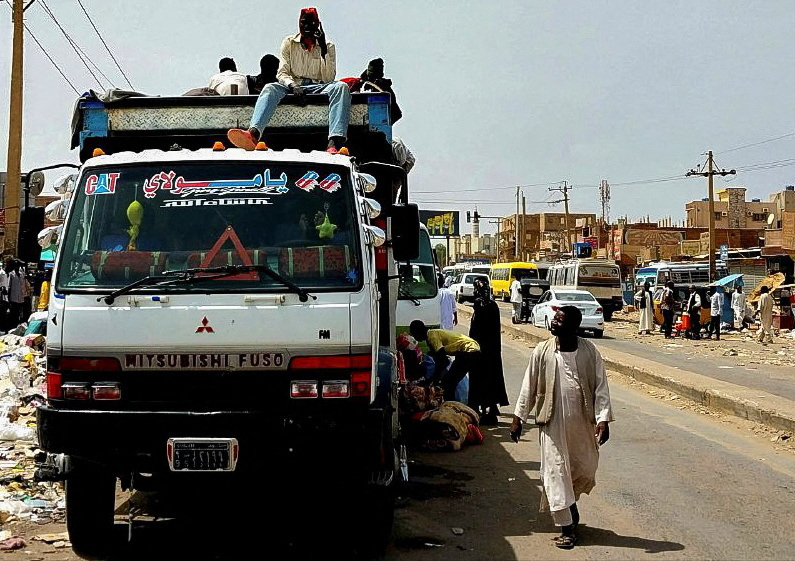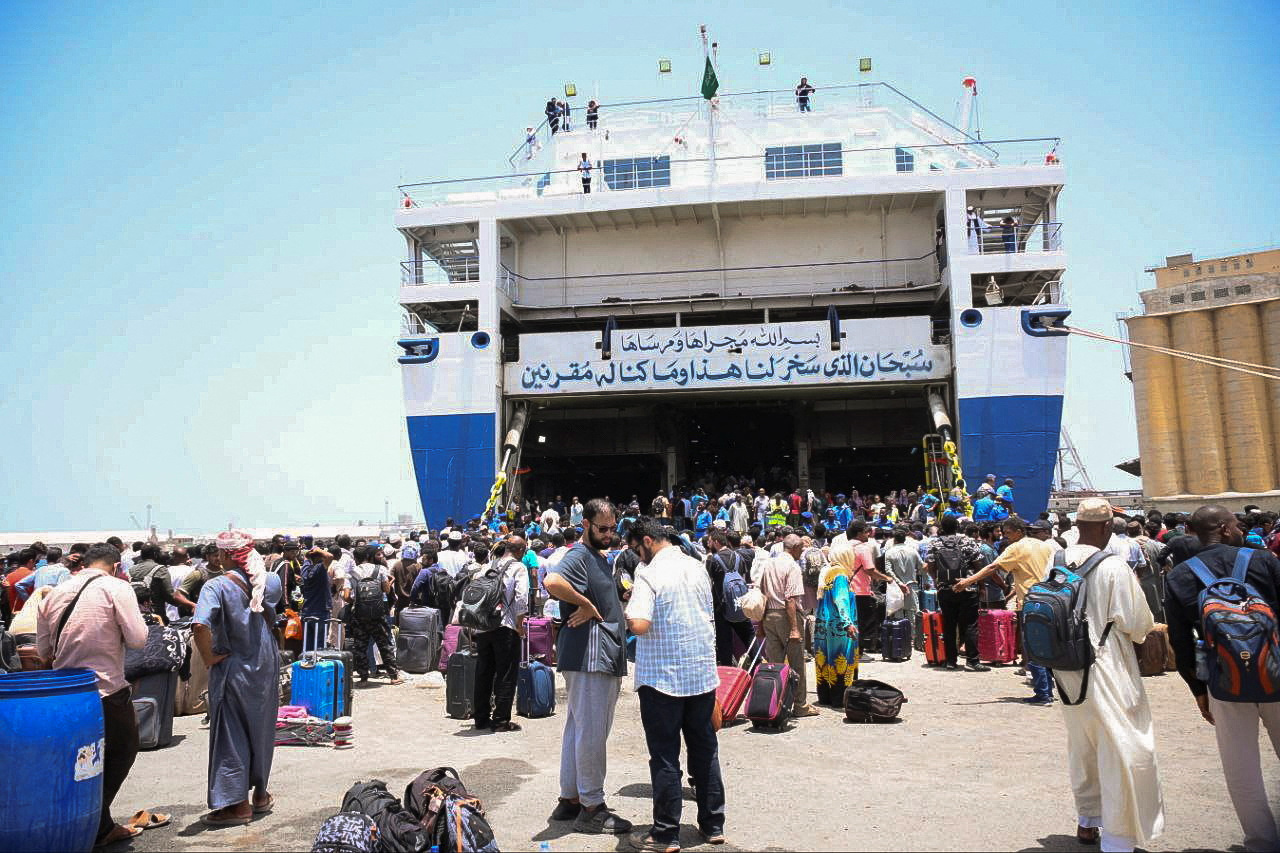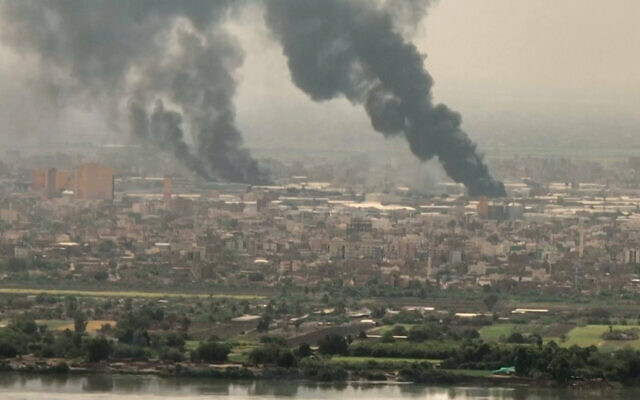Another Sudanese Conflict
"This is a huge country, very diverse ... I think it will be a nightmare for the world.""This is not a war between an army and small rebellion.""It is almost like two armies – well trained and well armed."Former Sudanese Prime Minister Abdalla Hamdok"[There was a recently noticeable change in the sides' attitudes; they appeared more open to negotiations, and were saying they would accept] some form of talks"."The word 'negotiations' or 'talks' was not there in their discourse in the first week or so."U.N. special representative in Sudan, Volker Perthes"I'm afraid that one day I'm asleep and I wake up to a bomb falling on my house.""That's my deepest fear right now. That's all that I think of. That's why I can't sleep at night."Khalid, resident of Khartoum
 |
| People gather to ride a truck to flee outside Khartoum, during clashes between the paramilitary Rapid Support Forces and the army, in Khartoum, Sudan April 28, 2023. REUTERS/ Stringer |
"The current fighting has forced us to stop almost all of our activities in West Darfur.""We are incredibly worried about the impact this violence is having on people who have already lived through waves of violence in the previous years."Sylvain Perron, MSF’s deputy operations manager for Sudan
In
2003 there was wholesale carnage in the area of Darfur, an African
farming community. There were disagreements between the Arab
pastoralists and the farmers of Darfur. The Muslim-majority Arab-led
government of the day under president Omar al-Bashir unleashed a
no-holds-barred conflict on the farming communities of ethnic
minorities, with military helicopters dropping bombs and the Janjaweed
Arab mounted militias attacking the largely helpless farming communities
who fled in terror.
Horrendous
war crimes were committed and al-Bashir was found guilty along with his
top general of war crimes and crimes against humanity. An estimated
300,000 people were slaughtered, and millions were left homeless.
At
the present time, Sudan's military had a shared custody of the country
with the leader of the Rapid Support Forces militia which had grown out
of the Janjaweed. Both General Abdel-Fattah Burhan who leads the
Sudanese military and General Mohammed Hamdan Dagalo leader of the Rapid
Support Forces (RSF) ended their temporary power sharing arrangement
over the issue of elections for a civilian government promised after the
previous one had been deposed.
Their
disagreement turned into a violent power struggle with the third
largest African country on the continent now engaged in a war that has
killed hundreds of its people, wounded many thousands and caused the
migration of over 75,000 people seeking haven from the conflict
elsewhere in neighbouring countries, while foreign governments have
taken emergency measures to evacuate their citizens to safety out of the
country.
A
number of temporary truces and ceasefires have come and gone, with
other African and Arab nations, the UN and US acting as mediators
between the adversaries in efforts to persuade them to reach an
agreement and cease hostilities. The capital Khartoum has become a war
zone. The truces are tentative and quickly breached, while in the
interim tens of thousands flee elsewhere for safety. Evacuations by
land, sea and air have come to an abrupt standstill, as the violence
continues and escalates.
 |
| European, Asian and African nationals prepare to board a ship to Saudi Arabia, at Port Sudan, Sudan April 28, 2023. REUTERS/Ibrahim Mohammed Ishak |
The
military's warplanes bombed the RSF in upscale neighbourhoods in
Khartoum on Friday while classes were reported as well around the
headquarters of the military, the Republican Palace and the area close
to the Khartoum international airport. Since the conflict erupted on
April 15, these are areas that have become flashpoints. In Khartoum's
sister city Omdurman, explosions have been noted as well.
In
Khartoum, medical workers report that medical personnel have been
abducted by the RSF to treat their wounded fighters. A voice note was
shared on a chat group for Sudanese health care workers giving warning
to wear civilian clothing, not medical uniforms, and to conceal any
identification that would list their profession, should RSF fighters
stop them on the street.
A
Sudanese-American infectious disease physician at the University of
Nebraska, working with community health leaders in Sudan shared the
stories of five doctors she knows who were taken from the streets of
Khartoum by the RSF since the fighting began. One of the abducted
doctors forcibly taken to an unknown location described seeing dozens of
wounded fighters, a stockpile of medical supplies and two other
kidnapped doctors working on the fighters.
His
days there were spent treating fighters with gunshot wounds, burns and
other injuries, before they were finally released. Neither the military
nor the militia have been able to strike a conclusive blow against the
other to this point. World powers struggle to convince them to set aside
the violence. An East African nation bloc has arranged an initiative
for the two sides to hold talks, promoted by the African Union, the
United States, the United Arab Emirates, Saudi Arabia and the United
Nations.
While denying that he has an ambitions to attain power for himself, General Burhan insists that General Dagalo "wants to rule Sudan, seize its resources and magnify his wealth".
He has ruled out speaking and engaging in negotiations with Dagalo
while accusing him of orchestrating a rebellion against the state.
 |
| This image grab taken from AFPTV video footage on April 28, 2023, shows an aerial view of black smoke rising over Khartoum. (AFPTV/AFP) |
Labels: African Union, Foreign Nation Evacuations, Rapid Support Forces Militia, Sudan Conflict, Sudanese Military

<< Home